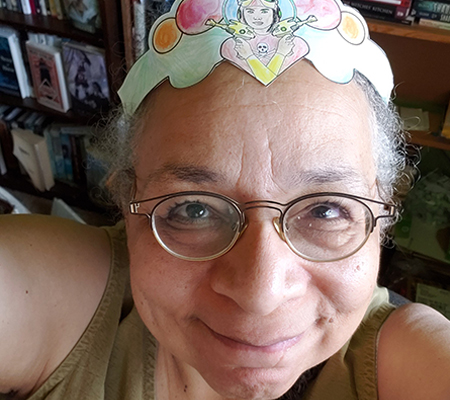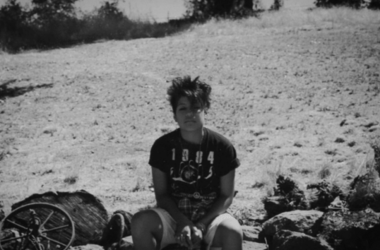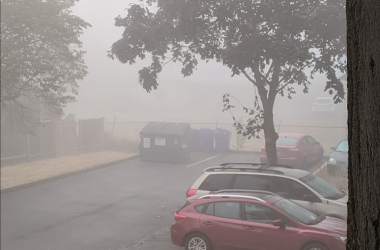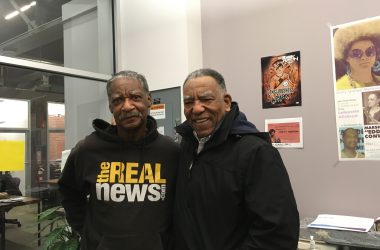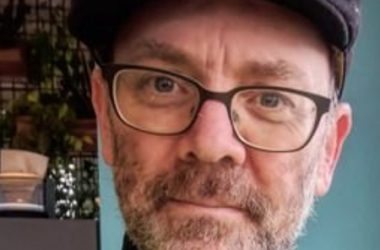By Nisi Shawl
Originally published on Our Plague Year
Here’s the summary-slash-takeaway: Tip big. Smile when you can. Call people on the phone. Be kind.
Okay. So I live in Seattle. King County. Washington. At the moment, per the King County Health Department, the number of deaths in the area attributed to COVID-19 is 26, with the number of confirmed cases standing at 234. But as the many event-canceling emails I receive from local organizations constantly remind me, “This is a rapidly evolving situation.” That case number will probably not stand still long. It will probably move, probably run–upward, no doubt. It could take off at a gallop, even, in the next few days, depending on test distribution and reliability. I don’t look to see the number of confirmed cases around here halt or fall for weeks, maybe even months.
I’m 64. I have asthma. Two factors placing me in what we’re calling “the high risk group.” I’ve learned how to make my own disinfectant wipes. I’ve backed out of public appearances. With trepidation I’m planning my next trip to the grocery store, strategizing where in my car I’m going to stash my disposable gloves, when and how often to hit the hand sanitizer, what to substitute if hoarders have bought all the bleach and bottled water.
This morning, as I returned from the café across the street with my pastry and tea (the waitress serving me wears gloves and I scrub down my mug before drinking from it), a woman headed toward me stepped off the sidewalk to make sure I passed her with more than six feet leeway. I was reminded of the Old South–except, of course, if this were the Old South, *I* would be the one stepping off the sidewalk for *her* (She was white. I’m not.).
People will tell you this town’s unfriendly. They’ll refer to the infamous “Seattle Freeze,” its citizens’ supposed lack of emotional warmth. I’m here to tell you that’s the exact opposite of my (previous) experience of this place. In the 24 years since I moved here from a small town in the Midwest, I’ve always felt rocked in the neighborly bosom of the loving kindness to which I’d grown up accustomed. Trucking down unfamiliar streets I’d say hello to strangers and they would say hello back. Fellow bus riders would recommend tasty restaurants to me. Occupants of nearby beach blankets offered helpful opinions on where to take my out-of-town visitors.
Is this about to change? “Social distancing” is the hot new phrase here on the forefront of the battle against COVID-19. Along with frequent handwashing, social distancing is meant to reduce the virus’s spread. Tiny, airborne drops of spit are apparently the disease’s main vector, and keeping apart to prevent getting sneezed on and sprayed with them certainly makes sense–but isolation has other effects we should keep in mind.
First of all, in prisons total isolation is used as a form of torture. Reputable research confirms this fact: We humans need human contact. Really, truly, physiologically *need* it. Another bit of advice offered to those of us in COVID-19-ridden areas: Stop touching your face. One study revealed unconscious face touching occurring in its sample population over twenty times per hour. Why? My theory is that when we can’t get enough of anyone else touching us we wind up doin it for ourselves.
Second, social distancing runs counter to many people’s innate response to catastrophes. Besides the more widely referenced “fight-or-flight” reaction, there’s a tendency in emergencies to “tend-and-befriend.” Rebecca Solnit examines it at length in her book A Paradise Built in Hell, which looks at the many strong communities arising from natural disasters. I’m one of these tend-and-befriend sorts myself–but my impulse to reach out and make sure *everybody* is all right is being partially thwarted by social distancing.
Thirdly–now how can I put this delicately? There’s just no way. I can’t. Social distancing lends itself to bigotry. It creates “thems” out of “us-es.” It divides people, and people divided are easily ruled.
I’d rather not play into rulers’ hands.
Jay Inslee, or as my pal trump and I like to call him, Governor Snake, has tried to mitigate this third problematic point by decreeing that “Viruses don’t discriminate.”
Other efforts to soften social distancing’s unintended evil consequences include a Facebook Group called “Corona-Proof Economy: Seattle branch;” a crowdfunder for Seattle artists hurt by gig cancelation, launched by journalist Ijeoma Oluo; and the nonprofit organization Humanities Washington’s “Cabin Fever Questions” email series: writing prompts, links to archived discussions, and invitations to social media interactions. In fact, social media seem to be taking up a lot of the slack that social distancing leaves hanging.
Here are my suggestions for some more ways to make the most of being near each other less:
- Tip big. If you’re using a grocery delivery service like Instacart or Postmates, double your usual tip. The people doing this work deserve to be rewarded for their persistence and bravery in the face of a bona fide pandemic.
- If you can, smile. Laugh. Take it for granted that anyone you encounter—in person or electronically–is experiencing at least as much stress as you are, and add a little humor to the situation so it becomes bearable.
- Call people on the phone. Yes, it’s more intrusive than a text or email. It also gives your recipient more of your presence: voice, breath patterns, background noises–a real cornucopia of non-contact physicality.
- Be kind. Extend yourself to neighbors, friends, kin, anyone in need, in ways that don’t pose a threat to their wellbeing or your own: pay their bills, drop staples at their door, walk their dog, whatever it takes. Whatever works.
That’s all I got for now. Stay deep. Nisi Shawl
Disinfectant wipes recipe: https://amindfullmom.com/diy-all-natural-disinfectant-wipes/
The Seattle Freeze: https://en.wikipedia.org/wiki/Seattle_Freeze
Social distancing: https://www.buzzfeednews.com/article/davidmack/social-distancing-coronavirus
Isolation as torture: https://www.psychologytoday.com/us/blog/almost-addicted/201801/solitary-confinement-torture-pure-and-simple
NIH study on face-touching: https://www.ncbi.nlm.nih.gov/pubmed/25637115
Tend-and-befriend stress response: https://en.wikipedia.org/wiki/Tend_and_befriend
A Paradise Built in Hell: http://rebeccasolnit.net/book/a-paradise-built-in-hell/
I like snakes: https://www.seattlepi.com/local/politics/article/Trump-calls-Gov-Inslee-a-snake-over-COVID-19-15112145.php
Viruses don’t discriminate: https://kingcounty.gov/depts/health/communicable-diseases/disease-control/novel-coronavirus/~/media/depts/health/communicable-diseases/documents/viruses-dont-discriminate.ashx
Corona-proof FB group: https://www.facebook.com/groups/213435473075598/
Fundraiser for Seattle artists: https://www.gofundme.com/f/for-artists
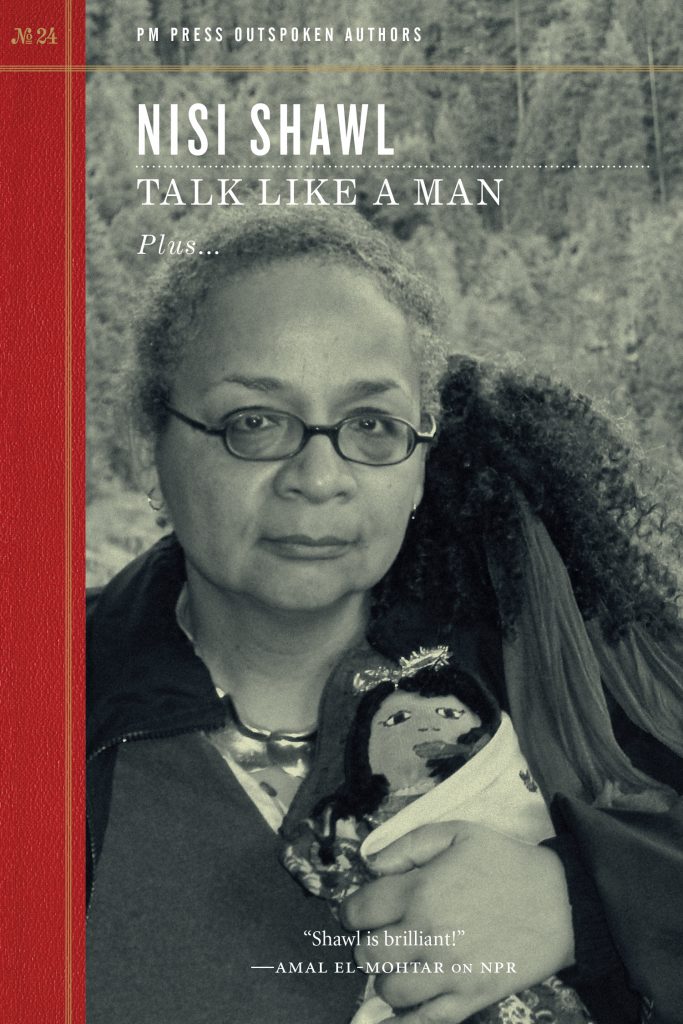
Nisi Shawl is an African American writer, editor, and journalist. They are best known for their science fiction and fantasy stories and novels dealing with race, gender, and sexual orientation. They live in Seattle, where they also write on political and cultural matters for the Seattle Times. Even before Shawl’s steampunk-flavored alternate history of the “Belgian” Congo, Everfair, took the sci-fi world by storm, their short stories had already established them as a cutting-edge black writer whose politically charged fiction is in the grand feminist tradition of Ursula Le Guin, Octavia Butler, and Joanna Russ.

